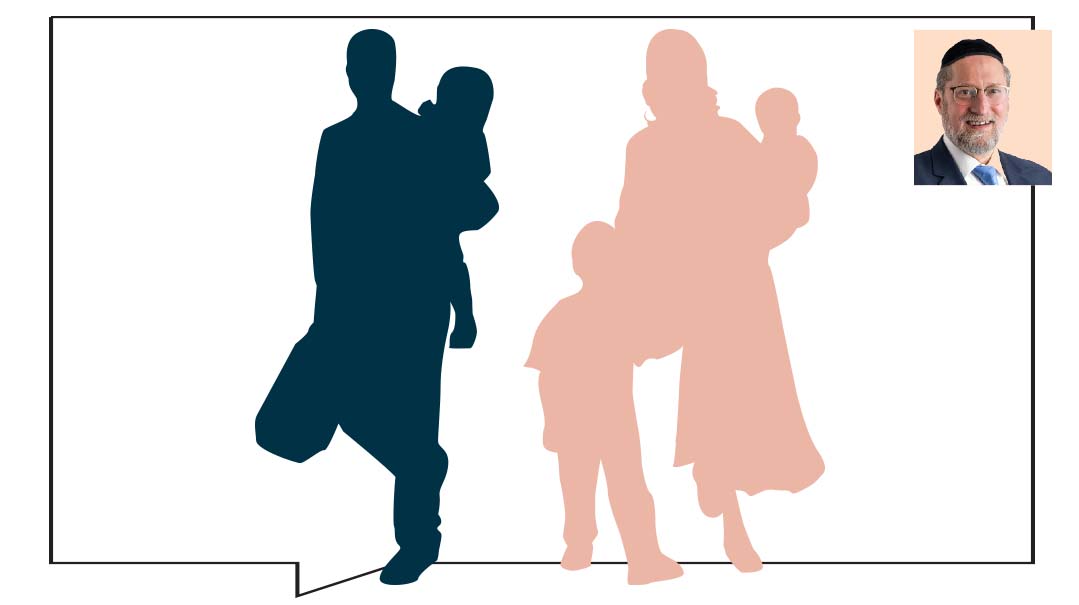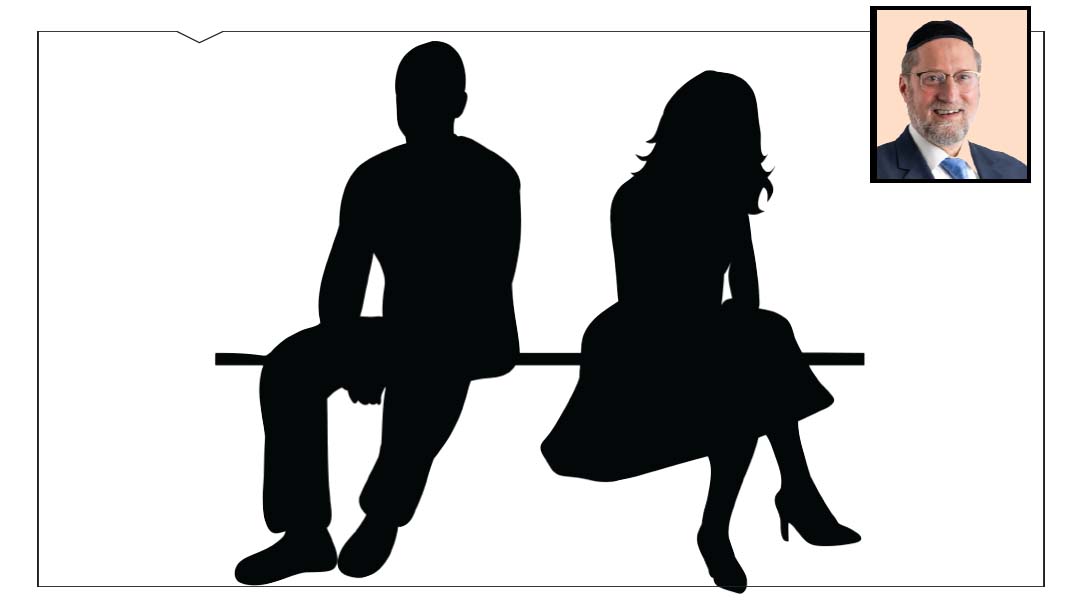Everything I Say, She Says the Opposite
| October 12, 2021Help, my wife doesn't respect me!

Written with Zivia Reischer
Rabbi Shafier,
Thank you for your excellent column.
I hope you can help me. I feel like there’s a weird dynamic between me and my wife. I’m not sure when it started, but I find that everything I say, she says the opposite. Any idea I have, she finds something wrong with it. This happens with little things and also with important things.
For example, she wanted to have the dining room painted. I came home from work and there were four paint swatches taped to the wall in different shades of gray. I told her I thought we could rule out the first two, one was too dark and one was too blue. She completely disagreed — it’s not too dark, it adds drama, we don’t always have to be so boring, the other one is not blue at all, how can you even say that.
So then I said, okay, you’re right, they’re all in the same color family, I’m fine with whatever you choose. But she didn’t like that either, she said they’re totally different colors, they’re not at all similar, and they do nothing for the room.
The crazy part was that later her sister came over to see the choices and said, “They all look the same to me.” And my wife totally agreed with her!
Maybe picking paint colors is not such a big deal, but it happens with important things also. When we’re not sure how to handle something with our kids, she’s very quick to shoot down any suggestion I make. If I suggest consulting with someone, she finds something wrong with every name I offer. Any plan I come up with, she points out the flaws. But if someone else were to voice the same idea as me, she has no problem with it. She’ll agree with them and even take their advice. It’s only my opinions that are totally disrespected. I really don’t understand what’s going on here.
Thank you for writing.
The dynamic you describe is actually not that uncommon. In fact, it’s simply a function of human nature: The more familiar we are with someone, the less respect we tend to treat him with. That’s why you might find someone who is very intelligent, even learned, maybe people even seek his advice — but his wife or other close family members don’t seem to value his opinion. It’s simply because when you know someone well, your natural appreciation of them tends to fade.
We see this play out when someone dies. You go to the funeral and hear all these wonderful things about the niftar and you’re surprised — I never knew he was such a special person. You’re even more surprised when you realize all the things you’re hearing are true, not exaggerations. You just never really thought about the person that way. You lived around him and simply never recognized the areas in which he was great.
We also see this dynamic clearly with kids. When kids are outside the home, they act better — more compliant, more guarded, more respectful. When they’re home, they relax and let down their guard, they might be less compliant, complain a lot, and even be chutzpahdig. Your kids are way more likely to be respectful to your neighbor than to you.
That might be normal for children, but not for adults. Studies show that a married couple will be more respectful to strangers than to each other. If a stranger were to offer an opinion, you’d be less likely to argue with him than if your spouse offered you an opinion. It’s human nature. But this natural tendency to argue can wreak havoc in a marriage, because it conveys the feeling that you don’t respect your spouse.
It’s just human nature not to appreciate the people we know well. Distance provides perspective — closeness blurs that perspective. Marriage is the closest of all relationships, so it’s understandable that this happens between spouses.
Understandable doesn’t make it okay, of course — but hopefully this explanation takes away some of the sting. It’s not personal. It’s not that your wife doesn’t respect you, she’s just accustomed to you, and she fell into a bad habit. She has to work on it. But the principle is always that no matter who is “causing” the issue, both parties have to work on the relationship. She has to work on changing her behavior. You have to work on your perspective — remembering that it’s not personal, and that change is very hard.
The situation this man describes is unfortunate, but not uncommon. If his wife had written to me, this is what I would tell her.
You certainly don’t mean to do this, but you’re making a common but critical mistake, one of the ten dumb mistakes that very smart couples make: forgetting that respect comes first. The Rambam explains that respect precedes love. There are two reasons for this.
First, if you don’t respect someone, you can’t love them. Love requires an enormous degree of giving to the other and of putting the other person first. Imagine if Rav Chaim Kanievsky was coming to stay at your house for a week — picture all the preparations that you would make and how you would prioritize his needs in every way, every moment, for the duration of his visit. When you respect someone greatly, such treatment is natural. But if you don’t respect them, it’s impossible to give to them to that degree. If you don’t respect your spouse, it will be impossible to love and give to your spouse properly.
Secondly, even if you could technically love someone without respecting them, it would be impossible for them to love you. You just don’t feel good around someone who doesn’t value and respect you.
While respect is critical for both men and women, lack of respect is hard on men in particular. If a man feels that he doesn’t have his wife’s respect, there is no consolation prize. He will not be happy in his marriage. This is different from women, whose need for respect is not prioritized as highly.
One Shabbos, my son-in-law was giving a devar Torah at the table. He happens to be very intelligent, spent many years learning full time, and he had obviously prepared. As he talked, the devar Torah became more and more complex, and I found myself losing track of his line of reasoning. Distracted by my inability to follow, I glanced over at my daughter, his wife, and I was surprised to see her watching her husband speak with rapt attention. She was totally focused on him and what he was saying. I thought, I spent many years in yeshivah learning at an advanced level and gave a shiur for decades, and I can’t follow his logic. And here she is, so engaged and engrossed. How is it possible that she can follow it so easily?
Afterward I said to her, “I noticed that you were very engrossed in the devar Torah. I’m very surprised because I myself had difficulty following it.”
She said, “I actually didn’t understand a word that he was saying.”
I said, “It sure didn’t look that way!”
“Listen,” she said, “I’m not just going to space out while he’s talking, I don’t want him to think I don’t care.”
I thought that was brilliant. If a wife shows her husband that he’s respected in her eyes, it creates a phenomenal positive force in their marriage.
It’s normal to become accustomed to your spouse’s opinion. You can predict what their point of view is going to be. Before they even open their mouth you know what they’re going to say, and you have your counterargument all prepared. But if you’re going to be quick to dismiss their point of view, that amounts to disrespect, which is severely damaging to a marriage.
Respecting your spouse, who is so familiar to you, requires work and focus. You have to avoid the natural tendency to treat your spouse with less respect than you give others. But your spouse is the single most important person in your world. The investment is worth it.
(Originally featured in Mishpacha, Issue 881)
Oops! We could not locate your form.







